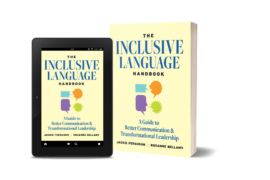Transformational change is possible, even at a 135-year-old Texas law firm.

Dallas-based Jackson Walker was founded in 1887, and now employs more than 450 attorneys at seven locations, making it the largest law firm in the state. While diversity, equity, and inclusion (DEI) had been important at the company for years, the events of early 2020 pushed the leadership team to become more intentional about their DEI efforts.
The groundwork for change began early that year, after land use/real estate attorney Suzan Kedron became chair of Jackson Walker’s Diversity Committee. Kedron, a partner and a Certified Diversity Professional, immediately added “Inclusion” to the committee name, and in that spirit, opened its membership to any attorney who wanted to serve.
“When I was tasked with taking over the committee in January 2020, I intended to be deliberate in my approach and carefully analyze needs,” she says. “The murder of George Floyd and the subsequent civil unrest that summer was a turning point that shattered my slow and steady plan and fast-tracked the ideas and initiatives we were evaluating.”
Like companies all over the country, the shocking death of George Floyd caused Jackson Walker to reevaluate its DEI efforts and commit to “action through listening, learning, and engaging” with its employees and in the community.
“As tragic as the events of that summer were, I am not sure we would be as far along today as we are,” Kedron says. “I think that it’s almost as if we were pushed off of a cliff, but instead of crashing down, we did what we needed to do and were able to fly.”
D&I Hours integrated diversity and inclusion into the flow of work
One of the first and most effective of the firm’s initiatives were the D&I Hours, an idea that came out of conversations between Kedron and Managing Partner Wade Cooper following Floyd’s death. Employees were distraught, especially as they were already reeling from the COVID pandemic.
“There was such an outpouring of people reaching out to both of them with very personal experiences and stories,” says Chad Cole, Diversity & Inclusion Engagement and Client Development Manager at Jackson Walker.
“They wanted to create a forum for everyone to help each other understand who we are not only as a firm, but who our colleagues are,” he says. “If we have a better understanding of who we are, then we can work better together. We have a personal connection.”
Envisioned as a safe space for colleagues to share their experiences and learn from each other, the D&I Hours are held every other month for attorneys and staff. An abbreviated list of topics includes the historical background and context of the Black Lives Matter movement, LGBTQ+ rights from the early 1900s through marriage equality, and the CROWN Act, which prohibits race-based hair discrimination at work and school. Outside speakers such as an influential Black pastor from Dallas and a Florida attorney who is on the autism spectrum have made presentations on their personal diversity journeys.
While these forums are primarily educational, they also highlight diverse attorneys and staff, diverse clients, and acts of service in the community. The meetings are a mix of Zoom and in-person presentations, so people from various Jackson Walker locations can also participate. Roughly 125 people log in regularly to participate live, and many more listen to the recorded sessions.
“The impact of these D&I Hours is not just to get together to see each other and have lunch,” Cole says. “It really is trying to help us understand everyone, their cultures, their backgrounds, and what uniqueness they all bring to the firm.”
Also in 2020, Jackson Walker established the four Pillars of Success to affirm the company’s commitment to support the growth and advancement of its diverse attorneys. Led by four teams of lawyers, projects and initiatives are planned in these areas: Cultural Awareness and Human Resources; Recruiting; Marketing and Business Development; and Professional Development, Advancement, and Retention.
Jackson Walker’s efforts have resulted in industry accolades. The Minority Corporate Counsel Association has included Jackson Walker among the top midsize firms on its 2021 Diversity Scorecard. The firm was also recognized by the Diversity & Flexibility Alliance, which ranked Jackson Walker among the top 30 law firms “Tipping the Scales” toward gender parity in promoting women to partnership. The honored firms were recognized for having 50% or more women among their 2021 new partner class, as reported in the Diversity & Flexibility Alliance’s New Partner Report.
Old and new lawyer resource groups
Along with new efforts, Jackson Walker expanded programs that were already working well, like lawyer resource groups.
The firm’s first affinity group, Jackson Walker Women, known as JW2, was established nearly 15 years ago to attract, retain, and promote women professionals. By creating networking and mentorship opportunities, JW2 has supported women attorneys at the firm. Kedron herself describes how she was welcomed to the firm by several women attorneys.
“I remember coming to Jackson Walker, and what I’d call the heavy-hitting women, they came to my office, and made it a point to take me out to lunch,” says Kedron, who recalls being surprised by the invitation that came from a senior partner and several other top women in the firm. “I’m just a little associate. Why would they do that?”
The answer to that question was an intentional desire to make Kedron feel welcome and to give her the support she needed to succeed at Jackson Walker.
This year, six more affinity groups or Lawyer Resource Groups (LRGs) were launched. The new groups are the Asian American LRG, Black/African American LRG, Hispanic American LRG, LBGTQ+ LRG, First-Generation LRG, and the Abilities LRG. Members discuss big DEI goals that fit with the firm’s mission and more narrow goals for the group and its members.
“These new LRGs have already taken off,” Cole says. “The Asian American LRG has already planned two internal [Continuing Legal Education] presentations going over recent laws or issues that have to do with international companies doing business in the U.S. The focus is on providing the best advice for our clients.”
DEI has improved recruitment and retention of diverse attorneys
The D&I Hours, the affinity groups, and other events have advanced Jackson Walker’s goal of promoting an inclusive work culture, a goal that became more urgent after the social unrest of 2020. That atmosphere of inclusion is expected to boost staff and attorney retention, and help attract diverse talent to the firm. In fact, Kedron says the LRGs are already popular with new hires.
At Jackson Walker, 35% of its lawyers are women and 18% of its attorneys belong to underrepresented groups, close to the industry average. At U.S. law firms, women account for 37.7% of total lawyers, people of color account for 18.5%, and LGBTQ+ attorneys account for only 3.7%, according to the 2021 NALP Report on Diversity.
Recently, Jackson Walker has increased its efforts to boost those numbers, and the firm is seeing results. In 2021, the majority of new fall associates and lateral hires at Jackson Walker were women or diverse. This was accomplished by creating intentional processes to diversify its hiring pipeline. Many of the firm’s methods are also best practices for the legal industry, and firms of all sizes can use these strategies to add diverse attorneys to their teams.
Jackson Walker sponsors a number of outreach efforts like scholarships and work-study programs to support diverse students who are considering a legal career. In addition, the firm attends job fairs for diverse candidates, supports law school affinity groups, and recruits from a variety of law schools that serve underrepresented students. The firm also makes sure that summer associates feel welcome and supported while they are at the firm and when they return to law school.
“I’ve had the opportunity to speak with many of their college groups, and it helps us with recruiting,” Kedron says. “We’re really invested in them not just when they get here and how many hours they bill, but who they are as a person and that they are growing in the communities that they go back to. Our firm’s long-term commitment is to make each and every one of them a partner.”
To attract lateral candidates, the firm targets specific attorneys who will add to the firm’s diversity and culture. “We’re very strategic in who we want,” Kedron says.
They’re also working on retention, using technology to monitor billable hours, so management can see inconsistencies and address them early on, before there’s a problem.
“I want to make sure that our attorneys of color and our attorneys who are part of my constituency, that we’re focusing on them,” Kedron says. “We want to give everyone the tools to succeed, and make sure that everything’s okay, so that we can be there to help them.
And while the attorneys are often front and center, the firm also wants to make sure the support staff are also happy and feel included in the firm’s DEI efforts.
“We want to make sure that our staff is taken care of,” Kedron says. “COVID has been hard on a lot of people, and we want to make sure we’re listening to what staff wants and what they need to be successful at their job.”
For everyone, part of the onboarding process includes an overview of what the Diversity and Inclusion Committee is doing, why it’s important to the firm, and how they can get involved. The committee is now one of the largest at the firm, with roughly 120 members.
The business case for diversity
While Jackson Walker’s DEI efforts have promoted a more inclusive culture at the firm, Cole and Kedron stress that there are also economic advantages. Many clients ask to work with diverse teams, Kedron says.
For example, one company particularly requested to work with more attorneys of color. The business development team put together a brochure featuring many of Jackson Walker’s diverse lawyers and their areas of expertise. The company was interested in getting help with contracts, but because of the brochure, ended up working with Jackson Walker on several projects.
“We basically just gave them a menu and said, ‘You’re a diverse company; you have a lot of different business issues. Here are some of our people,’” she says.
Cole adds, “Being in the business development department, I hear from my colleagues that we have definitely seen an uptick in clients wanting to know more about our Diversity and Inclusion Committee and our diversity initiatives here at the firm.”
Mansfield Rule Certification and other future initiatives
Jackson Walker is particularly proud of one ongoing initiative, seeking the Diversity Lab’s Mansfield Rule Certification. The goal of the program is to boost the representation of historically underrepresented lawyers in law firm leadership.
To gain certification, law firms must track and prove that they have considered at least 30% women, lawyers from underrepresented racial/ethnic groups, lawyers with disabilities, and LGBTQ+ lawyers for top leadership roles, senior-level lateral hiring, promotions into the equity partnership, and participation in client pitch meetings.
“We’re cautiously optimistic that we will become certified,” says Cole, who is spearheading efforts to collect the data for Mansfield certification. “Out of the categories that we have active participation in, we’re particularly proud that our candidate pool for partner election was above the 30% threshold of consideration that we needed.”
But the process has highlighted ways the firm could improve, for example, in the client pitch process. Now the business development team is encouraged to ask who is participating in those pitches and to track that information.
By going through the Mansfield certification process, which started in July 2021, the firm is paying more attention to how leadership decisions are made and being more intentional about including a diverse set of lawyers.
“Now that these processes have been put into place, we all have a better understanding of where we are, where we’re going, and the areas that we can improve on,” Cole says.
While the external accolades and certifications are important, one of the best results of Jackson Walker’s DEI journey has been the safe spaces created for the firm’s employees to learn from and support each other. Whether virtual, like the D&I Hours, or physical, like the Lawyer Resource Groups, these safe spaces are vital to creating a diverse, equitable, and inclusive workplace.
Jackson Walker is a large company, but small and medium-sized companies can access similar resources through DEI Navigator by The Diversity Movement. The platform allows leaders to collaborate with peers and discuss challenges in a safe space. It gives them access to certified experts and world-changing ideas, which will help clients attract and retain top-performing talent. There are tangible benefits of a robust diversity, equity, and inclusion strategy, and DEI Navigator means that those rewards aren’t just for large businesses.
Amber Keister is a Content Writer and Editor at The Diversity Movement. She has spent more than 20 years as a journalist for publications throughout the South. Connect with her on Linkedin.






